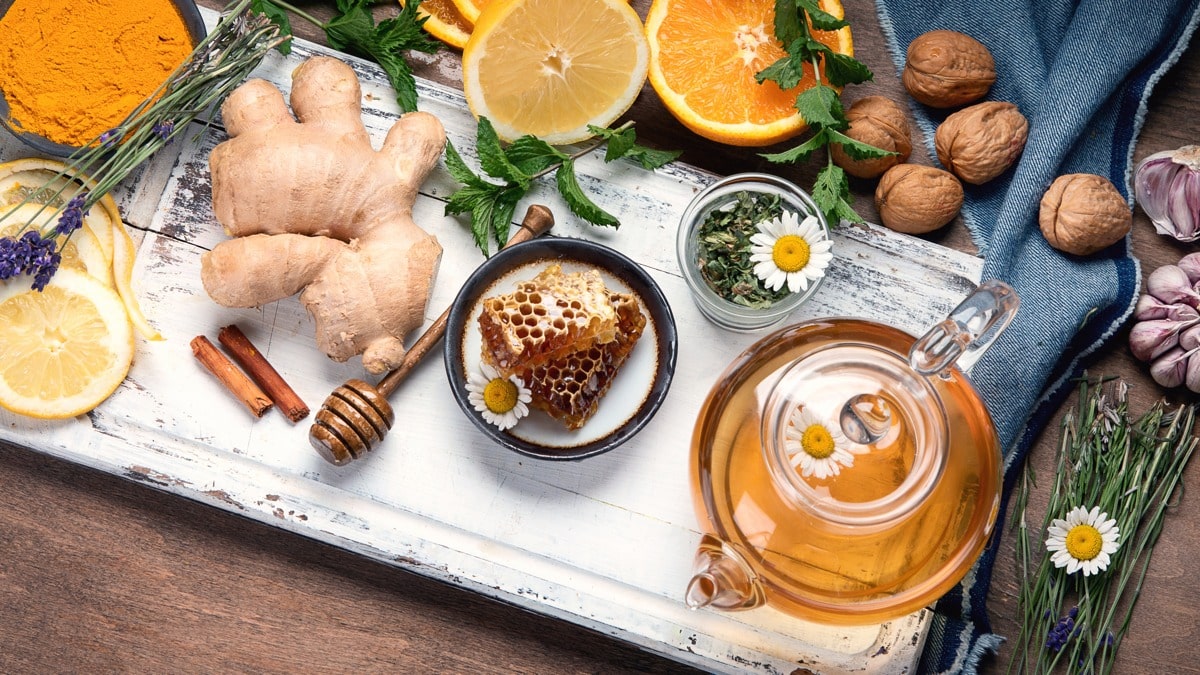In this guide
With COVID-19, influenza and a range of other flu-like viruses circulating this winter, we need to take extra precautions to avoid getting sick.
Aches, pains, fever, cough, runny nose, sore throat and fatigue can be pretty horrible for anyone, but when you’re over the age of 65 you have a higher risk of severe illness, complications and even death.
This is mainly because our immune system weakens as we age, producing fewer immune cells needed to fight infection. Older adults are also more likely to have other health conditions such as heart disease, diabetes, lung problems or kidney disease, which can increase the risk of becoming seriously ill. What’s more, appetite can wane and mobility issues can mean you’re less likely to cook, leading to micronutrient deficiencies that can impair the production and activity of antibodies and immune cells.
While vaccination is your best defence against the flu and Covid, eating a healthy diet combined with other lifestyle factors will help keep your immune system strong and reduce your risk of complications if you do contract a virus.
Key nutrients to support immunity
While every macronutrient and micronutrient is required for a healthy immune system, some nutrients play a more prominent role than others. Here we look at the key players that prime the body to fight infection and work as antioxidants to protect healthy cells.

Free eBook
Retirement planning for beginners
Our easy-to-follow guide walks you through the fundamentals, giving you the confidence to start your own retirement plans.
"*" indicates required fields
Protein
Protein is required to make immune cells such as antibodies, so if protein intake is inadequate our bodies may be less capable of mounting an attack against invading pathogens.
While protein deficiency is rare in developed countries, it’s important that we get all nine essential amino acids from our diet. Complete protein can be in the form of:
- Animal-derived food such as meat, fish, eggs and dairy
- Plant foods such as tofu, tempeh, chia seeds, hemp seeds, nutritional yeast, quinoa, amaranth, buckwheat and Ezekial bread (sprouted bread made from wholegrains and legumes)
- Complementary proteins such as grains with nuts and seeds, or grains with beans, peas and lentils (you don’t have to eat these at the same meal).
Fibre
With a surface area 20 times greater than our skin, the gastrointestinal (GI) tract is the largest barrier between us and the outside world. Our GI tract has the very selective job of extracting nutrients from food while preventing harmful pathogens from entering.
Fibre – found in vegetables, fruit, whole grains, nuts, seeds and legumes – promotes a healthy gastrointestinal barrier by:
• Helping food move along the tract so that toxins and harmful substances can be promptly eliminated
• Providing soluble fibres that are fermented by colonic bacteria to produce short-chain fatty acids that produce vitamins and antioxidants, promote nutrient absorption and enhance immunity.
Omega-3 fatty acids
Omega-3 fats may improve immune function by reducing inflammation and promoting healthy cell membranes.
There are different types of omega-3:
- Alpha-linolenic acid (ALA) found in plants such as walnuts, chia seeds, flaxseeds, hemp seeds, soybeans and canola oil
- Eicosapentaenoic acid (EPA), docosahexaenoic acid (DHA) and docosapentaenoic acid (DPA) found primarily in seafood.
While the body can convert some ALA to the long-chain omega-3 fatty acids EPA, DHA and DPA, this is limited so aim for at least two fish meals per week to achieve your recommended daily intake. If you follow a plant-based diet, you can supplement with 250mg daily of algae-derived EPA & DHA.
Supporting a healthy microbiome
As a large part of our immune system is housed in our gastrointestinal tract, eating foods rich in probiotics, prebiotics and polyphenols can help maintain a healthy microbial balance, which can prevent disease and promote health.
Probiotics are foods that contain healthy bacteria such as yoghurt, kefir (a fermented milk drink), kimchi (fermented vegetables), sauerkraut (fermented cabbage) and miso and tempeh (both made from fermented soybean).
Prebiotics are indigestible fibres that are fermented by the bacteria in our large intestine. Foods such as garlic, onion, leek, asparagus, Jerusalem artichoke and chicory contain prebiotics. You can also eat your bananas slightly green and your potatoes and rice cooked and cooled to maximise your intake of gut-friendly resistant starch.
Supercharge your retirement

Get pension and retirement tips and strategies with our free monthly newsletter.
"*" indicates required fields
Polyphenols are plant chemicals that have anti-inflammatory and antioxidant effects in the body, mainly via stimulating the growth of healthy bacteria in the gut. Boost your polyphenol intake by using spices and herbs when you cook or enjoying a cuppa, or by adding some berries to your brekkie, snacking on nuts and swapping your milk chocolate for dark chocolate. Vegetables high in polyphenols include celery, eggplant, red cabbage, leeks, onions, garlic, capsicum, chilli, broccoli and leafy greens.
Phytonutrients
The naturally occurring chemicals in plants help protect our cells from damaging free radicals, which can decrease our risk of disease and boost our immunity.
Polyphenols are one category of phytonutrient but there are thousands of other phytonutrients in fruit, vegetables, wholegrains, legumes and tea. The colour of plant food can tell you a little about its phytonutrients, so when you are planning meals, use the colours of the rainbow as a guide. But don’t forget white and brown plant foods. Garlic, onion, cauliflower and Asian mushrooms have amazing immune-enhancing potential.
Vitamin D
Vitamin D is vital for optimal immune function and a deficiency increases susceptibility to infection as well as certain autoimmune diseases such as type 1 diabetes and multiple sclerosis.
While some foods such as fish, egg yolk, fortified foods and mushrooms exposed to UV contain vitamin D, most is synthesised in the skin when it is exposed to sunlight. For Australians who can expose their skin to sunlight, it’s easy to get enough vitamin D in the Australian summer, but in winter you need to make sure you get two to three hours of sunlight every week. People with dark skin need three to six times this amount. Those who cover up for religious or cultural reasons and the infirm may need to supplement.
B vitamins
The B vitamins work together in concert so a deficiency in any of them will impair the immune system.
Vitamins B6, folate and B12 are crucial for cell synthesis and white blood cell production. Plant foods including strawberries, asparagus, broccoli, spinach and legumes are high in folate. Banana, watermelon and potatoes are good sources of vitamin B6 and dairy and eggs are good sources of B12. Meat, fish and poultry are excellent sources of B6 and B12.
If you’re vegan, include one B12 fortified food at each meal, such as a plant milk with added B12 or nutritional yeast flakes. Otherwise, it’s important to supplement with 50–100mcg B12 daily.
Vitamin A
Vitamin A supports the production of antibodies and lymphocytes and helps maintain epithelial cells, which are the cells that line the surface of the body including the skin and the mucous membranes. Without vitamin A, the epithelial cells lack integrity and pathogens can easily get a foothold, causing infectious disease.
Significant sources of vitamin A are fish, dairy and eggs. Plant sources are in the form of beta-carotene, which can be converted to vitamin A and can also act as an antioxidant. Orange fruits and vegetables and green leafy vegetables are high in beta-carotene.
Vitamin C
Vitamin C is vital for a healthy immune system. It strengthens resistance to infection and its antioxidant powers help protect cells from free radical damage, reduce inflammation and repair and regenerate healthy tissue. Vitamin C may even reduce the duration of the common cold.
Vitamin C is also nature’s antihistamine so, if you have nasal congestion, eating fruit and vegetables high in vitamin C like kiwi fruit, strawberries, broccoli, Brussels sprouts and red capsicum may help.
Vitamin E
Vitamin E is important for healthy immune cell function and may increase antibody response to several pathogens. Vitamin E is also a potent antioxidant, preventing cell destruction by unstable and highly reactive free radicals.
Foods rich in this fat-soluble vitamin include wheat germ (wheat germ oil is particularly high), eggs, wholegrains, spinach, nuts and seeds. A serve of almonds (30g) provides over 7mg of vitamin E, which is 50% of the suggested dietary target for women and 37% for men.
Zinc
Zinc is a mineral that is crucial for the normal development and function of immune cells including lymphocytes, neutrophils and macrophages.
Even mild zinc deficiency can impair immune responses and increase susceptibility to infections.
Significant sources of zinc include seafood, meats, poultry and dairy. Plant sources include wholegrains, spinach, pumpkin seeds and cashew nuts.
Selenium
Together with beta-carotene and vitamins C and E, selenium is a key antioxidant nutrient that defends the body against harmful free radicals.
The selenium found in Brazil nuts, seafood, meat, poultry, wholegrains, sunflower seeds and mushrooms also protects us from infection by assisting in the production and function of white blood cells and regulating the inflammatory response.
Brazil nuts are so high in selenium that you can meet your recommended daily intake of selenium with two nuts per day!
Iron
Iron is a component of many enzymes that play a role in immune cell function. Iron deficiency seriously impairs immune system surveillance, increasing our risk of infection. Meat, fish, poultry, eggs, tofu, legumes, wholegrains, spinach, herbs and spices are some of the foods that provide iron. Shellfish such as clams, oysters, octopus and mussels are excellent sources.
Vitamin C helps the body absorb iron so if you need to increase your iron intake, include at least one vitamin C-rich fruit or vegetable at every meal.
Copper
Copper helps maintain immune function and is essential for iron metabolism.
Found in foods such as seafood, nuts, seeds, legumes and wholegrains, deficiency is rare, however people with coeliac disease and those taking zinc or iron supplements for extended periods may be at risk.
Beta-glucans
Beta-glucans are polysaccharides, which are a form of complex carbohydrate found in the bran of oats and barley and in the cell walls of various mushrooms (such as shiitake) and yeasts (such as nutritional yeast flakes).
Beta-glucans have the ability to regulate our immune system, meaning they can stimulate immune system activity while controlling overactivity, as you see with allergies.
Carnosine
Chicken soup’s well-renowned restorative powers are due to a dipeptide called carnosine.
Carnosine is an immunomodulator, which means that it can both enhance weakened immune systems and suppress overactive immune systems that can contribute to autoimmune diseases and allergies. Carnosine also possesses strong antioxidant properties that protects cell membrane damage. It’s found in beef and pork, as well as chicken.
Avoid ultra-processed foods
Highly processed foods often contain large amounts of saturated fat, trans fat, refined grains and/or sugar and a bunch of additives and preservatives which can promote inflammation. Over time, this can lead to chronic inflammation, immune dysregulation, cancer, heart disease and type 2 diabetes. In the short term, these foods are empty calories that displace healthy, immunoprotective foods in our diet.
Whole foods over supplements
While some nutrients play a more prominent role in immune system function than others, our bodies rely on all nutrients to function optimally.
A daily multivitamin may help support immune function when you are feeling under par and your diet is inadequate, but megadoses of a single nutrient can inhibit the immune system and cause disease.
Whole foods package nutrients in a balanced way with thousands of other health-promoting compounds we are yet to fully understand, so the aim should always be improving your diet rather than supplementation.
Maintain a healthy weight
Obesity is a risk factor for immune dysfunction, as excess body fat releases chemical messengers that cause chronic inflammation. Being at the other end of the scale also affects immunity, as underweight can impair the body’s ability to effectively respond to infectious disease.
If you want to lose weight, try to focus on nourishing your body with whole foods rather than following restrictive diets that can result in micronutrient deficiencies.
Reduce alcohol
Australians love a drink, with 1 in 4 adults exceeding the alcohol guidelines in 2020–21. But if you’re trying to strengthen your immunity, it may hinder your efforts.
For starters, alcohol affects amino acid and protein metabolism, so binge and chronic drinking slows the synthesis of proteins required for proper immune function, weakening the body’s defences against infection.
Alcohol metabolism generates free radicals and also reduces the levels of antioxidants that can neutralise them – a double whammy that can result in cell injury and eventually organ damage.
Excessive drinking renders people more susceptible to various types of infection, such as pneumonia. Inflammation in the lungs causes tissue damage, increasing barrier permeability and allowing pathogens to enter. Impaired protein synthesis means that the body can’t respond quickly to the infectious pathogen, and recovery can be slow. Older people with alcohol use disorder (AUD) may not recover.
The bottom line
Apart from getting our annual vaccinations, there’s a lot we can do to strengthen our immune system and lower our risk of complications from the many viruses circulating this winter. A healthy diet plays an important role in bolstering ageing immune systems to ensure they are functioning at their best.
Kate Barnes (RNutr, BAppSc, GDipHumNutr) is a Sydney-based nutritionist and founder of Nutrition Coach, where she works with clients to change behaviours and promote optimal nutrition.



Leave a Reply
You must be logged in to post a comment.